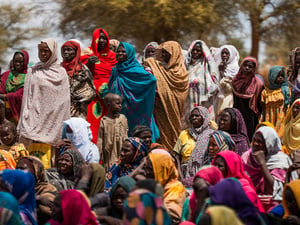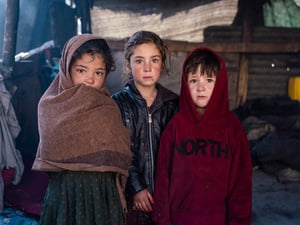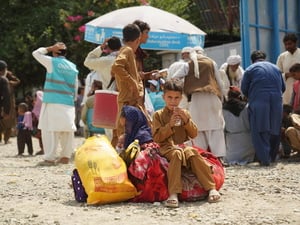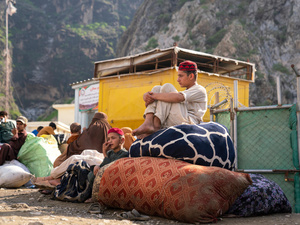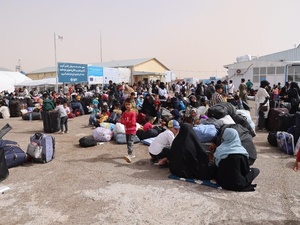Northern Alliance gains have not led to large-scale population displacements
Northern Alliance gains have not led to large-scale population displacements
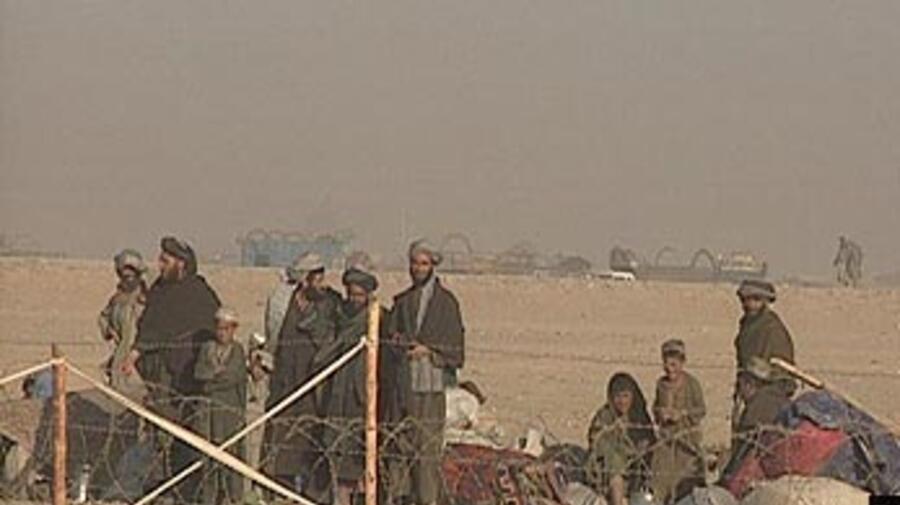
Refugees waiting to enter the Killi Faizo staging site, which has again been closed to new arrivals by local authorities.
GENEVA, Nov. 13 (UNHCR) - The rapid military gains made by Northern Alliance forces across much of Afghanistan during the past few days have not led to large-scale refugee exodus, raising hopes that UNHCR and other humanitarian organisations will soon be able to assist people inside the country.
"We urge military forces to exercise restraint and show respect for civilians, especially as they start moving into other ethnic areas," UNHCR spokesman Ron Redmond told a news briefing Tuesday. "We do not want to see a new Afghan exodus."
But he warned that the changes now taking place in Afghanistan did not mean that the agency did not have to be prepared for the possibility of a massive influx of new refugees into Pakistan and Iran. In fact, there were unconfirmed reports Tuesday that a significant number of refugees, thought to number about 3,000, were arriving in Mohmand Agency in north-west Pakistan.
Redmond said the return of international UNHCR staff members to Afghanistan would have to await clearance from UN security co-ordinators. The agency has been working inside Afghanistan for many years, and still co-operates with some 100 small, non-governmental organisations in that country.
"We would hope we could go right back in and pick up the infrastructure that was there," he said.
To prepare for such an eventuality, UNHCR is airlifting supplies to Termez, Uzbekistan, for deployment into Afghanistan as soon as possible. A second airlift of 670 tents was scheduled to leave Tuesday following Sunday's relief flight that delivered 45 tons of tents. In all, the airlift is expected to transfer 4,000 tents and 4,000 plastic tarpaulins for possible use inside Afghanistan.
In a statement Tuesday, the agency expressed serious fears about the safety of some 6,000 internally displaced Afghans in the Makaki camp in Taliban-controlled territory near the Iranian border. According to the latest reports, Northern Alliance forces have surrounded the camp, which allegedly has Taliban fighters mixed in with the camp's civilian population. The agency said it was "extremely fearful" that the displaced Afghans in the camp "could become human shields or hostages."
"UNHCR is also appealing to the government of Iran to look into the possibility of opening its borders to allow in Afghan civilians from the camp, which is just a few kilometres inside Afghanistan," the statement said.
Food and water supplies at the Makaki camp were reported to be very limited, and aid workers did not report to the camp Tuesday after hearing reports of overnight fighting in the area. "UNHCR has declined to work in any of these camps for as long as the security and protection of the displaced people and aid staff could not be assured," the agency's statement said.
In another development, Pakistan authorities Tuesday gave UNHCR authorisation to resume transferring vulnerable Afghans from the Killi Faizo staging site near the Chaman border to the Roghani camp further inside Afghanistan. The transfer had been halted earlier in the day by Pakistan Frontier Corps troops at Chaman.
UNHCR moved more than 640 Afghans to Roghani from Killi Faizo following an agreement last week between the agency and the Pakistan government allowing the opening of 11 camps in the country. The agency has long contended that the staging site is too close to the border and should be used only as a transit centre for refugees now entering in Pakistan.
As if to underline the point, there were reports Tuesday that three Taliban soldiers brandishing rocket propelled grenade launchers came within 50 metres of Killi Faizo before withdrawing.
Although the Pakistan Frontier Corps Monday night refused to allow UNHCR to pre-register or temporarily shelter some 300 persons who recently entered Pakistan, they permitted one malnourished child to enter Killi Faizo's health centre for day treatment, but he was forced to leave the compound at night.
"UNHCR tried to persuade the Frontier Corps to let the child's family shelter in a tent outside the camp overnight, but the troops refused to let us send a tent to the other side of the forced encampment," Redmond said.
A woman who gave birth Tuesday morning just outside the camp fences, however, was allowed into a tent on the site itself.
With regards to the Iranian border, UNHCR said it was still waiting for permission from Teheran to allow a second humanitarian convoy, organised jointly with the Iranian Red Crescent Society, to be sent to Herat. The convoy, which will take 2,000 plastic sheets and 10,000 blankets, is still expected to depart this week despite reports of fighting near the city.
Over the past three days 2,649 people returned to Afghanistan from Iran via the northern border crossing of Dogharoun. The voluntary returns have continued unabated throughout the crisis, with people saying they wanted to rejoin their families. "Now, returnees say they are no longer motivated by concerns for their family members, but are just happy to be going home," Redmond, the UNHCR spokesman, said.
"Should the situation in western Afghanistan remain stable, UNHCR is likely to see an increase in spontaneous returns from Iran, which currently hosts more than 2.3 million Afghan refugees," Redmond said, quoting Iranian government figures.

